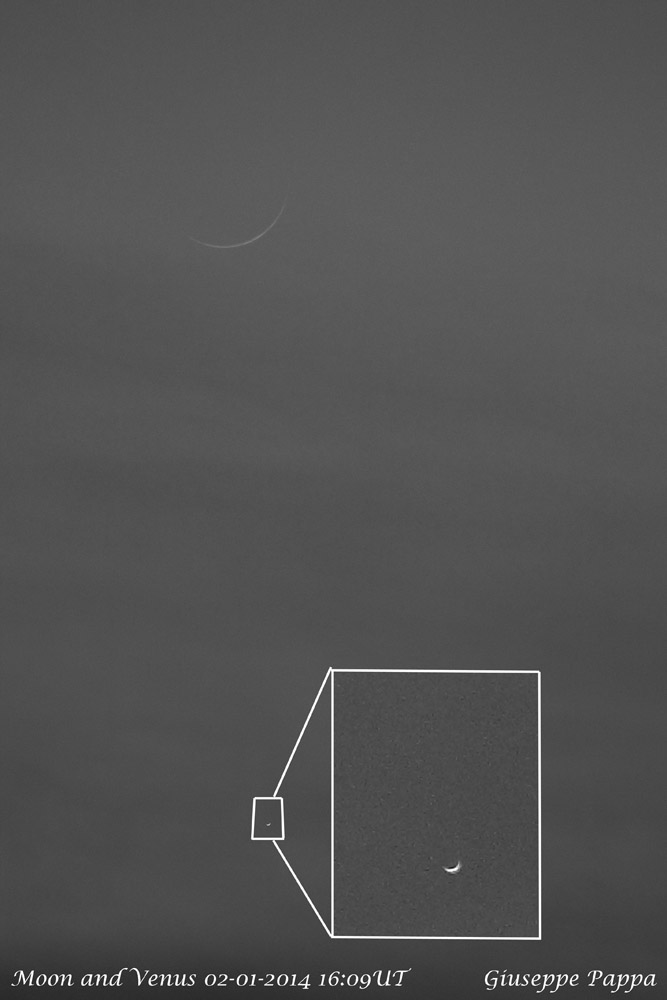Difference between revisions of "January 4, 2014"
| Line 1: | Line 1: | ||
__NOTOC__ | __NOTOC__ | ||
=Tiny Moon, Tiny Venus, Big Discovery= | =Tiny Moon, Tiny Venus, Big Discovery= | ||
| − | |||
<!-- ws:start:WikiTextHeadingRule:0:<h1> --> | <!-- ws:start:WikiTextHeadingRule:0:<h1> --> | ||
<!-- ws:start:WikiTextLocalImageRule:6:<img src="/file/view/LPOD-Jan4-14.jpg/480493656/LPOD-Jan4-14.jpg" alt="" title="" /> -->[[File:LPOD-Jan4-14.jpg|LPOD-Jan4-14.jpg]]<!-- ws:end:WikiTextLocalImageRule:6 --><br /> | <!-- ws:start:WikiTextLocalImageRule:6:<img src="/file/view/LPOD-Jan4-14.jpg/480493656/LPOD-Jan4-14.jpg" alt="" title="" /> -->[[File:LPOD-Jan4-14.jpg|LPOD-Jan4-14.jpg]]<!-- ws:end:WikiTextLocalImageRule:6 --><br /> | ||
| − | <em>image by [mailto:giuseppe.pappa@alice.it Giuseppe Pappa], Sicily, Italy</em><br /> | + | <em>image by [mailto:giuseppe.pappa@alice.it" rel="nofollow Giuseppe Pappa], Sicily, Italy</em><br /> |
<br /> | <br /> | ||
| − | Now-a-days, most professional astronomers don't bother to look at planets when they are bright in the sky. But this observation by Mohammed recreates a critically important observation by Galileo in 1610 that proved that the Ptolemaic model of the solar system could not be correct. Galileo compared the phases of Venus, which he discovered, with the well understood phases of the Moon. The Venus phases could only be explained if the planet orbited the Sun, as Copernicus proposed. It is rather amazing that Galileo could actually detect [http://www.exo.net/~pauld/workshops/Galileoscope/galileovenus.jpg Venus' phases] with his low quality telescope. But at its the maximum crescent phase - like now - Venus is nearly visible to the unaided eye (it is slightly more than 60 seconds of arc across), so that was the easiest phase for him to see. <br /> | + | Now-a-days, most professional astronomers don't bother to look at planets when they are bright in the sky. But this observation by Mohammed recreates a critically important observation by Galileo in 1610 that proved that the Ptolemaic model of the solar system could not be correct. Galileo compared the phases of Venus, which he discovered, with the well understood phases of the Moon. The Venus phases could only be explained if the planet orbited the Sun, as Copernicus proposed. It is rather amazing that Galileo could actually detect [http://www.exo.net/~pauld/workshops/Galileoscope/galileovenus.jpg" rel="nofollow Venus' phases] with his low quality telescope. But at its the maximum crescent phase - like now - Venus is nearly visible to the unaided eye (it is slightly more than 60 seconds of arc across), so that was the easiest phase for him to see. <br /> |
<br /> | <br /> | ||
| − | <em>[mailto:tychocrater@yahoo.com Chuck Wood]</em><br /> | + | <em>[mailto:tychocrater@yahoo.com" rel="nofollow Chuck Wood]</em><br /> |
<br /> | <br /> | ||
<strong>Technical Details</strong><br /> | <strong>Technical Details</strong><br /> | ||
Revision as of 22:54, 4 January 2015
Tiny Moon, Tiny Venus, Big Discovery

image by " rel="nofollow Giuseppe Pappa, Sicily, Italy
Now-a-days, most professional astronomers don't bother to look at planets when they are bright in the sky. But this observation by Mohammed recreates a critically important observation by Galileo in 1610 that proved that the Ptolemaic model of the solar system could not be correct. Galileo compared the phases of Venus, which he discovered, with the well understood phases of the Moon. The Venus phases could only be explained if the planet orbited the Sun, as Copernicus proposed. It is rather amazing that Galileo could actually detect " rel="nofollow Venus' phases with his low quality telescope. But at its the maximum crescent phase - like now - Venus is nearly visible to the unaided eye (it is slightly more than 60 seconds of arc across), so that was the easiest phase for him to see.
" rel="nofollow Chuck Wood
Technical Details
Tiny crescent Moon (2%) and tiny waxing Venus (3%) in conjuction after sunset at 16:09 UT 01-02-2014. I took the image, with a canon eos 1100d+300mm lens set at 400ISO and 1/320s exposure.



